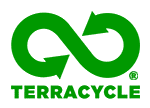This is an old revision of this page, as edited by Bananasoldier (talk | contribs) at 06:37, 30 March 2014 (→Products: rewording). The present address (URL) is a permanent link to this revision, which may differ significantly from the current revision.
Revision as of 06:37, 30 March 2014 by Bananasoldier (talk | contribs) (→Products: rewording)(diff) ← Previous revision | Latest revision (diff) | Newer revision → (diff) For the bicycle company, see TerraCycle (recumbent cycling). | |
| Company type | Privately held company |
|---|---|
| Founded | Trenton, New Jersey, United States, 2001 |
| Founder | Tom Szaky, Co-founder and CEO Robin Tator, Co-founder and President of TerraCycle Canada |
| Number of locations | 26 countries |
| Products | Goods made from recycled products |
| Services | Recycling |
| Website | terracycle |
TerraCycle is a private U.S. small business headquartered in Trenton, New Jersey. It makes consumer products from pre-consumer and post-consumer waste ("upcycling") and by reusing other waste materials. The company is known for its environmentalist aspects.
Company history
TerraCycle was founded in the fall of 2001. Tom Szaky and Jon Beyer co-founded the company.
In 2002, the company created a continuous flow composting process to take garbage and have it processed by worms into fertilizer. Funded by prize money from various contests and angel investors, TerraCycle continued to operate. In 2005, Home Depot Canada and Wal-Mart Canada began carrying TerraCycle products. In 2007, TerraCycle began making their drink pouch pencil cases. As of 2011, TerraCycle accepts materials in approximately 40 specialized categories.
Legal issues
Scotts Miracle-Gro Company sued TerraCycle in 2007 for copyright infringement, claiming false advertising and trade dress violations. In response, TerraCycle started a media campaign. Scotts eventually dropped the case upon an agreement with TerraCycle to alter TerraCycle's product packaging.
Products
TerraCycle began with the production of fertilizer made from vermicompost, which is made by feeding organic waste to worms. The worms' excrement is then liquefied. It packages the material in reused plastic water bottles, in the past collected through the "Bottle Brigade" fund raising program at schools and charities around North America.
The company diversified its production into upcycling around 2007 and began creating products from other waste items. For example, it makes pencil cases and backpacks made from used drink pouches. Various products from pre-consumer waste and post-consumer waste include messenger bags, binders, notebooks, and tote bags.
Packaging waste that can not be upcycled is recycled into plastic products including flower pots, plastic lumber, plastic pavers, bike racks, park benches, and garbage and recycling cans.
References
- ^ "Company Overview of TerraCycle Inc". Bloomberg Businessweek. Retrieved 25 July 2013.
- Burlingham, Bo. "The Coolest Little Start-Up in America". Inc. Magazine. Retrieved 30 March 2014.
- Jo Piazza (July 28, 2002). "Garbage In, Garbage Out. A Princeton Success Story". New York Times. Retrieved 2010-04-14.
By October Thomas Szaky, a sophomore from Canada who is majoring in economics, hopes to have his worm-based waste management business, Terracycle International Inc., meet a goal of disposing of 15 tons to 30 tons of organic waste a day in Princeton Township.
{{cite news}}: Cite has empty unknown parameter:|coauthors=(help) - "TerraCycle Website Brigade Listings".
- ^ Rob Walker (May 20, 2007). "The Worm Turns". New York Times. Retrieved 2010-04-14.
{{cite news}}: Cite has empty unknown parameter:|coauthors=(help) - Hofman, Mike. "Legal Lemons, PR Lemonade". Inc. Magazine. Retrieved 30 March 2014.
- ^ Loten, Angus. "After a Good Fight, David Forced to Settle with Goliath". Inc. Magazine. Retrieved 30 March 2014.